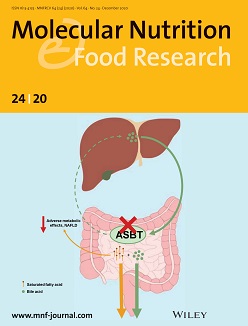
On the cover: The Beneficial Effects of ASBT Inactivation Depend on Dietary Fat Composition
17 December 2020

Back Cover: Molecular Nutrition & Food Research: Vol 64, No 24
Reported by:
- Ivo P. van de Peppel
- Anuradha Rao
- Marleen B. Dommerholt
- Laura Bongiovanni
- Rachel Thomas
- Alain de Bruin
- Saul J. Karpen
- Paul A. Dawson
- Henkjan J. Verkade
- Johan W. Jonker
Inactivation of the apical sodium bile acid transporter (ASBT) interrupts the enterohepatic circulation of bile acids and subsequently impairs lipid absorption. Asbt−/− mice are protected from obesity, insulin resistance and fatty liver disease when fed a high‐fat diet rich in saturated but not polyunsaturated fatty acids, highlighting the importance of dietary composition in assessment of treatments targeting bile acid homeostasis.
Read more : https://onlinelibrary.wiley.com/doi/10.1002/mnfr.202000750
Last modified:04 January 2021 11.38 a.m.
More news
-
15 September 2025
Successful visit to the UG by Rector of Institut Teknologi Bandung
